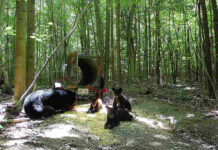The usual six-mile drive home from Sunday church took a pleasant turn some weeks ago. As I headed back to the farmette for more coffee and more newspapers, my mind went a different way and, without one turn of any wheel, I was on my way to the southern Illinois dairy farm of my youth.
Elements
Back then most Sunday drives home from church featured three elements: a well-scrubbed Ford station wagon with at least five kids and no seatbelts in its back seat; the car radio relaying the tape-recorded highlights of the St. Louis Cardinals‘ past week; and the penetrating smell of my father’s slow-burning Camel cigarette.
If it was summer, all the windows of the big-fendered boat would be down so we could enjoy what was sure to be the closest thing to air conditioning we’d feel all week. Winter delivered the opposite: windows tightly closed so the rolling oven would (we vainly hoped) roast us well-done so we’d remain warm for seven days.
And spring, summer, fall or winter we boys — Rich, David, me and Perry — sat like straight-backed little sinners all in a row, felt hats atop no-smile faces made stiff by starched collars, narrow ties and real fear of an angry God. Or so it seemed.
Change in the air
Back then the pre-war Lutherans — pre-World War I, that is — were long on law and short on love. When a young minister arrived in the mid-1960s and began to teach the New Testament as much as the Old, mild grumbles about too-little law and too-much Gospel filtered through after-service visits in the churchyard.
My parents, to their eternal credit, never passed on the gripes. They found little fault in their new shepherd’s preaching and no fault whatsoever in his perfect, dairy-county name: Pastor Holstein. True. I couldn’t make that up. Nobody could make that up.
In the 100 or so drives to and from church each year, the after-church drives during the fall were best. In almost half of those 1960s Septembers and Octobers, the Cardinals were either fighting for a pennant or a World Series ring.
That made the Sunday radio replays like a victory lap; we knew how they ended so we’d cheer before Jack Buck or Harry Carey joyously announced a Bob Gibson strikeout or Lou Brock stolen base. Wow, we loved those teams. Still do.
Well-traveled road
A curious little irony of the drive home, however, was that we Lutherans spent most of it on St. Leo’s Road, a meandering blacktop named after a middle-of-nowhere Catholic church that commanded the high bluffs overlooking our farm.
St. Leo’s, its rectory, social hall, empty one-room school and burying ground seemed both misplaced and perfectly placed.
Misplaced because few farms and fewer people were nearby; well-placed because from the shade of its broad maples you could see the confluence of the Kaskaskia River with the Mississippi miles away.
A second lovely irony each week was that on our way to church we usually chugged through this little outpost of Rome just as the Papists were letting out. That meant we had to toss a weak wave or smile at our oh-so-heathen neighbors while my father would smile and acknowledge the men folk — “Hey, Gary” — through his open window.
We’d slowly putter through, then head for the Lutheran bastion farther up the road and, hopefully way, way up the road, heaven.
Return
Three hours later, heaven and hell were left behind and 18 or so miles to home beckoned. Recently, it beckoned again. Maybe it was the crackling blue sky that fine morning or maybe it was the smell of harvest, thin and drought-starved though it is this fall. Or maybe it was just a graying farmboy, having just heard the Word, looking homeward.













